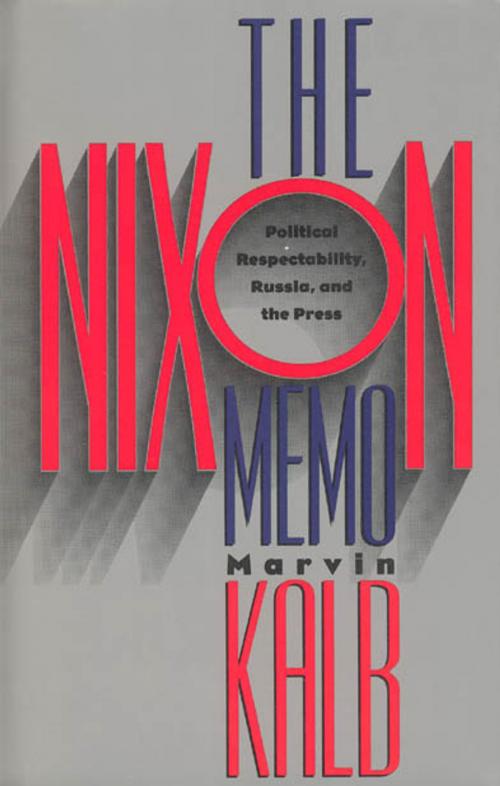The Nixon Memo
Political Respectability, Russia, and the Press
Nonfiction, History, Americas, United States, 20th Century, Biography & Memoir, Political, Social & Cultural Studies, Political Science| Author: | Marvin Kalb | ISBN: | 9780226221618 |
| Publisher: | University of Chicago Press | Publication: | January 10, 2019 |
| Imprint: | University of Chicago Press | Language: | English |
| Author: | Marvin Kalb |
| ISBN: | 9780226221618 |
| Publisher: | University of Chicago Press |
| Publication: | January 10, 2019 |
| Imprint: | University of Chicago Press |
| Language: | English |
An absorbing example of political journalism, The Nixon Memo is a case study of Richard Nixon's relentless quest for political rehabilitation. At issue is the key role of this former president of the United States (best known for his involvement in the famous "watergate" scandal) in the post-cold war debate about aiding Russia in its uncertain revolution.
The story begins on March 10, 1992. Nixon had written a private memo critical of president George Bush's policy toward Russia. The memo leaked and exploded on the front page of The New York Times. Why would Nixon attack Bush, a fellow party member fighting for re-election? Why on an issue of foreign affairs, which was Bush's strength? The questions are as intriguing as the answers, and distinguished journalist and scholar Marvin Kalb offers a suspenseful, eye-opening account of how our conventional wisdom on United States foreign policy is shaped by the insider's game of press/politics.
This story of Nixon's Machiavellian efforts to pressure the White House, by way of the press, into helping Boris Yeltsin and Russia sheds new light on the inner workings of the world inside the government of the United States. Marvin Kalb read the documents behind the Nixon memo and interviewed scores of journalists, scholars, and officials in and from Washington and Moscow. Drawing on his years of experience as a diplomatic correspondent, he identifies and illuminates the intersection of press and politics in the fashioning of public policy.
"An absorbing and often compelling argument that Richard Nixon directed his own political rehabilitation on the world stage, using presidents, lesser politicians, and the press as his supporting cast. This is a first-class job of unraveling a complex and usually unseen tapestry."—Ted Koppel
"With Marvin Kalb's captivating account, Richard Nixon continues to fascinate us even in death."—Al Hunt
An absorbing example of political journalism, The Nixon Memo is a case study of Richard Nixon's relentless quest for political rehabilitation. At issue is the key role of this former president of the United States (best known for his involvement in the famous "watergate" scandal) in the post-cold war debate about aiding Russia in its uncertain revolution.
The story begins on March 10, 1992. Nixon had written a private memo critical of president George Bush's policy toward Russia. The memo leaked and exploded on the front page of The New York Times. Why would Nixon attack Bush, a fellow party member fighting for re-election? Why on an issue of foreign affairs, which was Bush's strength? The questions are as intriguing as the answers, and distinguished journalist and scholar Marvin Kalb offers a suspenseful, eye-opening account of how our conventional wisdom on United States foreign policy is shaped by the insider's game of press/politics.
This story of Nixon's Machiavellian efforts to pressure the White House, by way of the press, into helping Boris Yeltsin and Russia sheds new light on the inner workings of the world inside the government of the United States. Marvin Kalb read the documents behind the Nixon memo and interviewed scores of journalists, scholars, and officials in and from Washington and Moscow. Drawing on his years of experience as a diplomatic correspondent, he identifies and illuminates the intersection of press and politics in the fashioning of public policy.
"An absorbing and often compelling argument that Richard Nixon directed his own political rehabilitation on the world stage, using presidents, lesser politicians, and the press as his supporting cast. This is a first-class job of unraveling a complex and usually unseen tapestry."—Ted Koppel
"With Marvin Kalb's captivating account, Richard Nixon continues to fascinate us even in death."—Al Hunt















